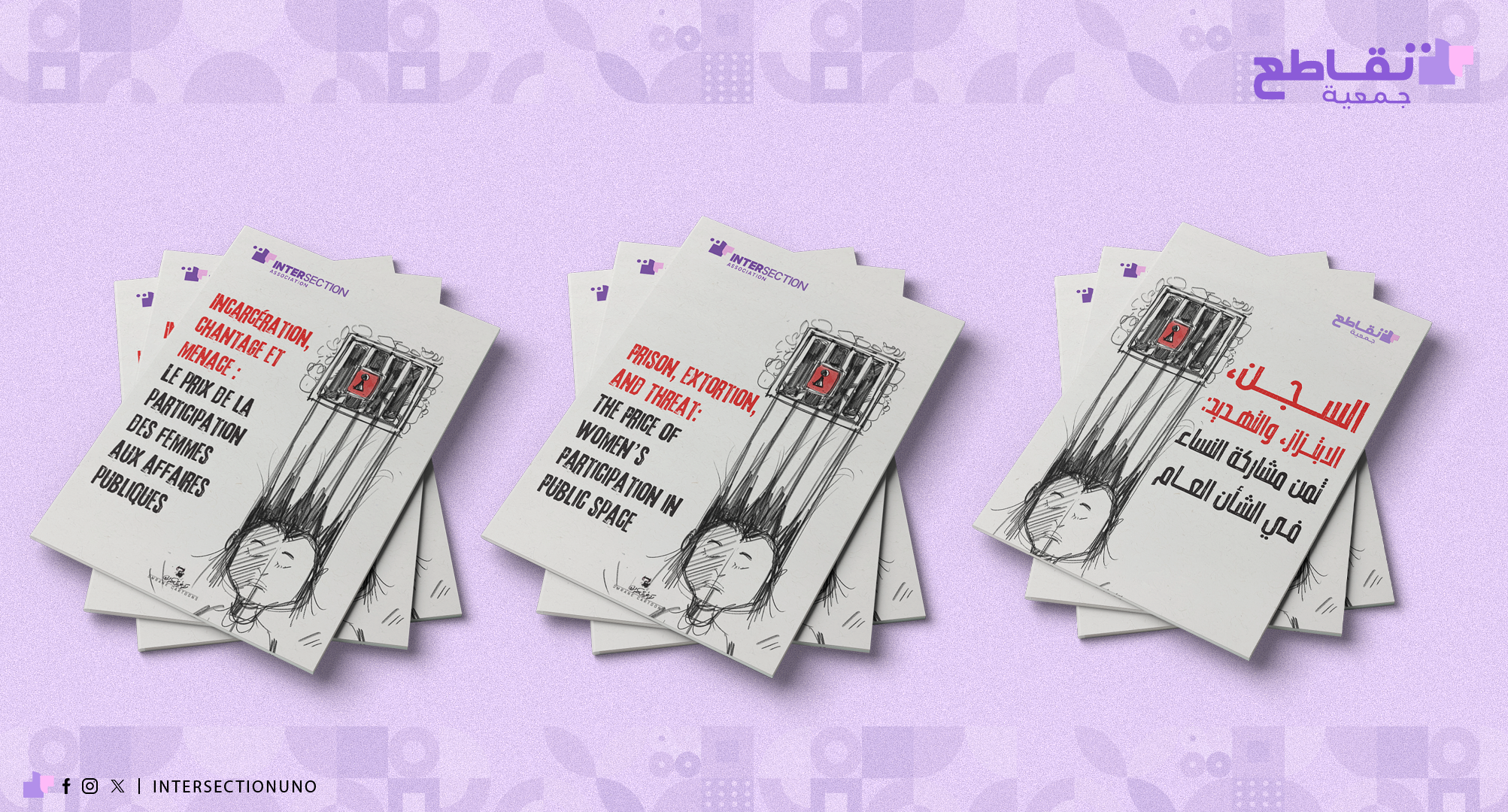To access the report: Prison, Extortion, and Threat The Price of Women’s Participation in Public Space
Intersection Association for Rights and Freedoms, in partnership with the Euro-Med Rights (Tunis), issued a report titled ‘Prison, Extortion, and Threats: The Price of Women’s Participation in Public Space.’ The report focuses on the violations inflicted upon active women and those interested in public affairs, especially in recent times since July 2021, which represented a significant turning point in the Tunisian political and human rights milieu due to the decisions and measures taken by the current authorities, negatively impacting the rights and freedoms system in Tunisia. These included restrictions on freedom of expression, assembly, and organization, in addition to repressive practices against active women, including journalists, politicians, lawyers, among others, who were targeted by the Tunisian state either through judicial prosecutions or security follow-ups, besides being defamed in official speeches and labeled as agents and traitors, leading to their exposure to systematic campaigns based on violence, cyber harassment, and defamation on social media, amid complete silence from the Tunisian state, which remained inactive in the face of violence waves targeting women of various statuses, including politicians discussed in specific cases listed under ‘Female Politicians in Tunisia: Between Systematic Targeting and an Uncertain Future,’ and journalists pursued for their independent and free journalistic work. The report also addresses ‘Feminists and Civil Activists Under the Yoke of Repression,’ focusing on feminist activists and human rights defenders facing various forms of violence due to their activism. In addressing this topic, the report relied on a set of direct interviews and telephone communications with victims of violations, gathering data from civil society organizations, political parties, information from media outlets, and social networks, including analyzing reports and research from rights-based and feminist associations. It included collecting testimonies from women who suffered assaults related to their work or activism in rights and political circles. The report contains analytical sections about forms of violence against women, including digital violence as an extension of physical violence, and the invasion of privacy, concluding with the impact of violence on the victims’ psyches. The report concludes with a set of recommendations, including: – Respect of the right to political and party activity, including the right to compete for power or participate in it by exercising the right to run in party and coalition lists and independent candidacy, and the right of citizens to freely choose all their representatives. – Enact Law No. 58 of 2017 to address violence against women and children and provide a special budget to ensure that the right to protection and access to justice is achieved in an equal manner for women and men. – Establishment of a body of units specialized in crimes of violence against women and children to investigate cases of cyber violence and prosecute perpetrators before the courts to address the phenomenon of impunity for cybercrimes against women. – Guarantee the right of individual and collective protest by peaceful assembly, demonstration, and strike without infringing on these freedoms and without security or judicial prosecution. – Guaranteeing the right to a fair trial for women, starting with respecting legal procedures at, all stages of the hearing, investigation, and trial, adopting the presumption of innocence of the accused until proven guilty, and abandoning the arrest of suspects and the search for charges. – Enabling women's access to justice by automatically providing legal aid to women victims of cyber-violence and undertaking the victims of this type of violence, which is no less serious than other types of violence. – Guarantee the right of civil activity for national and professional associations and organizations and stop threatening them with unjust laws that aim to limit their activities or monitor them in advance and only apply Decree No. 88 of 2011 on the organization of associations. – Respect freedom of thought, expression, and publication, including freedom of the press and the right of citizens to access all information and opinions through free, independent, and pluralistic media, including freedom of expression on social media without infringing on the rights of others. – Repeal Decree No. 54 on combating crimes related to information and communication systems and only apply Decree No. 115 of 2011 on freedom of the press, printing, and publishing without discrimination on political grounds. – Respect the right of ethnic, religious, and sexual minorities to exercise their individual and collective rights without security restrictions or judicial prosecutions as long as they do not infringe on the rights of others. – Return to the application of the principle of horizontal and vertical parity in candidacy for elected bodies with a commitment to parity in appointments to administrative and political positions and taking into account the principle of women's competence in civil and political participation. – Abolish all forms of labor discrimination against women in terms of assignments, wages, and professional promotion, and end forms of vulnerable employment in agriculture, domestic work, and other sectors. – Ratify the Istanbul Convention on Combating Violence against Women and Domestic Violence of 2011, provide a special budget for the implementation of Law No. 58 of 2017 on combating violence against women and children, and provide mechanisms to access justice and fight impunity. To access the report: Prison, Extortion, and Threat The Price of Women’s Participation in Public Space

